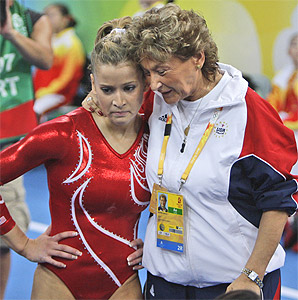Chinese gymnasts shine, but black cloud hovers over gold medal
It was supposed to get them into a we-can-do-anything mode. And for a while it seemed to work. The U.S. came out on Wednesday morning and took an early lead over the favored Chinese in the first apparatus of the team finals by more than half a point, with Bridget Sloan, Alicia Sacramone and Johnson all landing good, clean vaults.
They followed that up with three solid routines on the uneven bars: Chellsie Memmel starting it off with a solid 15.725, Johnson following with a steady 15.350, then Liukin reeling off a stunning 16.90. The Americans were six-for-six in hitting their routines, and the pressure fell squarely on the backs of the young Chinese.
And we do mean young. Their passports are issued by a Chinese government that is very, very interested in winning lots and lots of gold medals, so while they may say they're 15 or 16, five of the six team members have the appearance of pre-pubescent children. "The little babies," is how U.S. coach Martha Karolyi refers to the Chinese gymnasts when speaking to her team, and they certainly are little. Li Shanshan (16) is 4-foot-9, 79 pounds. Yang Yilin (15) is 4-foot-11, 77 pounds. He Kexin (16) is 4-foot-8, 73 pounds. Jiang Yuyuan (16) is 4-foot-7, 71 pounds. But the prize goes to Deng Linlin (16), who's listed at 4-foot-6 and a strapping 68 pounds. She could take a nap in Yao Ming's sneaker. Poor thing's also missing a tooth. Please, someone send baby food.
But can they ever fly from the uneven bars! The baby-faced trio of Jiang, Yang and He whirled around the bars like little acrobats, switching hand holds, spinning backwards, flipping left and right. After Jiang's 15.975, Yang put up a roof-raising 16.80 which was then trumped by He's 16.85. The resulting total of 49.625 put the Chinese ahead of the Americans by a solid 1.125 points with only two rotations left.
It didn't look good, but Cheng Fei, the one member of the Chinese team who competed four years ago in Athens, gave the U.S. hope when she fell off early in her beam routine and scored just 15.15. Li and the tiny Deng, though, followed that up with strong beam routines, leaving the Americans with no room for error.
Sacramone, 20, first up for the Americans, made short work of the suspense, falling as she tried a front pike mount off a springboard onto the beam. Afterward Karolyi explained that Sacramone had lost her focus after twice being forced to wait by beam officials after her name had been announced.
"They put her name up with a stop sign," an animated Karolyi said. "She couldn't go once, she couldn't go twice, and in my opinion it was intentional. Alicia's a little bit too emotional. I told her, 'They tried to break your focus, and you let them do it.'"
Long delays while the judges deliberate are not uncommon in gymnastics, and in any event, the gymnasts are supposed to handle any eventuality, regardless of the situation. Liukin and Johnson, dependable as ever, followed Sacramone's 15.10 routine with two great beam performances, scoring 15.975 and 16.175, respectively, to enable the Americans to narrow the gap slightly. So with the floor event remaining, the U.S. trailed the host country by exactly one point.
It wasn't a good situation to be in, since the Chinese had outscored the U.S. in the floor during the preliminaries. But it certainly wasn't an impossible deficit to overcome. Sacramone, the team captain and its spiritual leader, again was first up. But she hadn't put the fall off the beam completely behind her, and again she committed a fatal gaffe, under-rotating an Arabian on her second tumbling pass and falling backwards. "I don't know what happened on floor," she said afterward, fighting back tears. "I thought my feet were under me on that Arabian, and the next thing I knew I was on my back."
She stepped out of bounds on her final pass, but the damage had already been done. Sacramone's 14.125 on floor eliminated any realistic hopes of a comeback. Liukin and Johnson also stepped out during their otherwise solid floor routines, but those small deductions only mattered in determining the final margin of the Chinese victory. Afterward, in a touching moment, Johnson slipped her arm through Sacramone's and laid a consoling head on her shoulder. Then she said something that made Sacramone laugh, no small trick at that juncture.
"Usually it's Alicia who's keeping everyone else up," Liukin said. "So it was kind of different for us to be doing it to her this time. She kept telling us she was sorry, so sorry, but we still love her. And we still have a silver medal, which is great. China had fewer mistakes than we did. It was their day to shine."
And shine they did, to the delight of the 19,000-some pro-Chinese crowd that packed the National Indoor Stadium, roaring at every tumbling pass of the final three Chinese gymnasts. The final margin of victory over the U.S. was a comfortable 2.375 points, 188.90 to 186.525. The bronze went to Romania, which scored 181.525.
So the Chinese women have their first Olympic team gold medal. Good for them. But their prize will always be viewed under a cloud of suspicion -- prior to these Games, several publications, most notably TheNew York Times, found evidence that at least two of the Chinese gymnasts were only 14, two years younger than the Olympic minimum -- and to some extent the image of gymnastics has suffered a black eye. The Olympics is, above all else, based on the principles of fair competition, and the promotion of healthy bodies through sport. There is something mildly discomfiting about the sight of such tiny youngsters weighed down by the hopes of a nation, even after the gold medals are hanging around their feathery necks.





